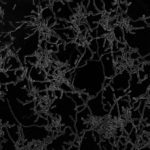Lien vers Pubmed [PMID] – 40667009
Lien DOI – 10.1101/2025.06.29.662174
bioRxiv 2025 Jun; ():
Azole antifungals are widely used to treat Candida infections, yet therapeutic failures are common. In addition to resistance, fungal populations can exhibit tolerance and heteroresistance, subpopulation-driven drug responses that can contribute to treatment failure. Here, we performed a genome-wide association study (GWAS) on 557 genetically diverse C. albicans isolates to identify genetic loci associated with fluconazole susceptibility, tolerance, and heteroresistance. We uncovered a complex, polygenic architecture underlying all three traits, involving novel loci linked to stress responses, cell cycle, and genome integrity. Notably, canonical resistance genes were absent from our top associations, reflecting either their low frequency or lineage specificity. Functional validation of several candidate genes confirmed distinct genetic determinants for each drug response. Heritability estimates and conditional analyses revealed that susceptibility and heteroresistance are governed by partially overlapping but largely independent loci, with some genetic variants displaying opposing effects on different traits. This limited overlap suggests that each phenotype represents a distinct evolutionary strategy for drug evasion, which may not be simultaneously addressed by a single therapeutic approach. Our findings underscore the polygenic nature of adaptation to antifungal drugs and expand our understanding of drug response mechanisms in C. albicans .Despite advances in antifungal therapies, treatment failures in Candida albicans infections remain common and poorly understood. Standard clinical diagnostic tools rely on susceptibility testing to predict treatment outcomes, yet many treatment-refractory infections are caused by strains that appear susceptible in laboratory tests. This study provides the first genome-wide dissection of three distinct drug responses – susceptibility, tolerance, and heteroresistance – across a global population of C. albicans isolates. By identifying novel genetic contributors beyond canonical resistance genes, our findings shift the current paradigm toward a more nuanced, polygenic model of antifungal adaptation. These results underscore the importance of integrating tolerance and heteroresistance into clinical and research frameworks and point to new molecular pathways that could be leveraged to enhance antifungal strategies.

